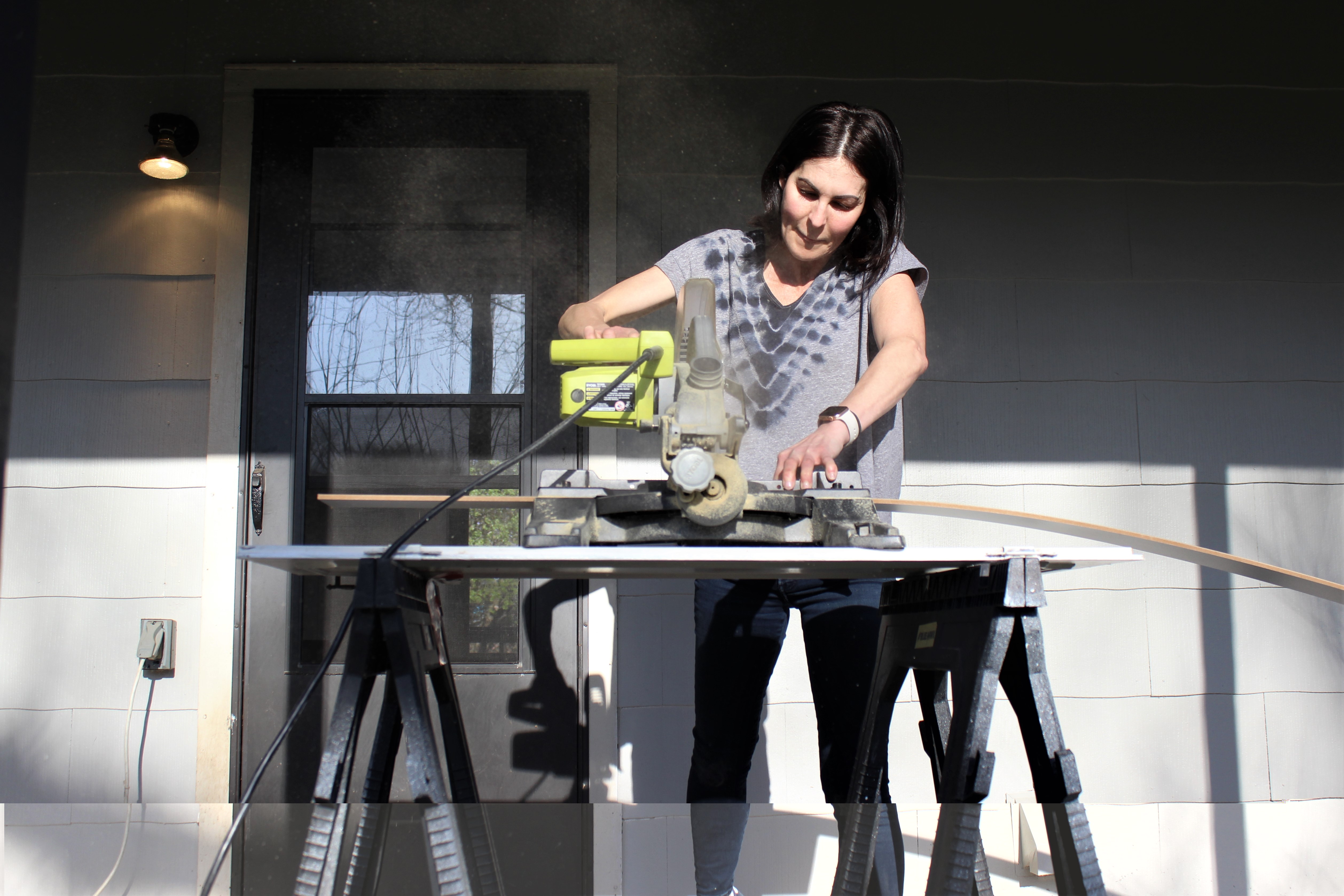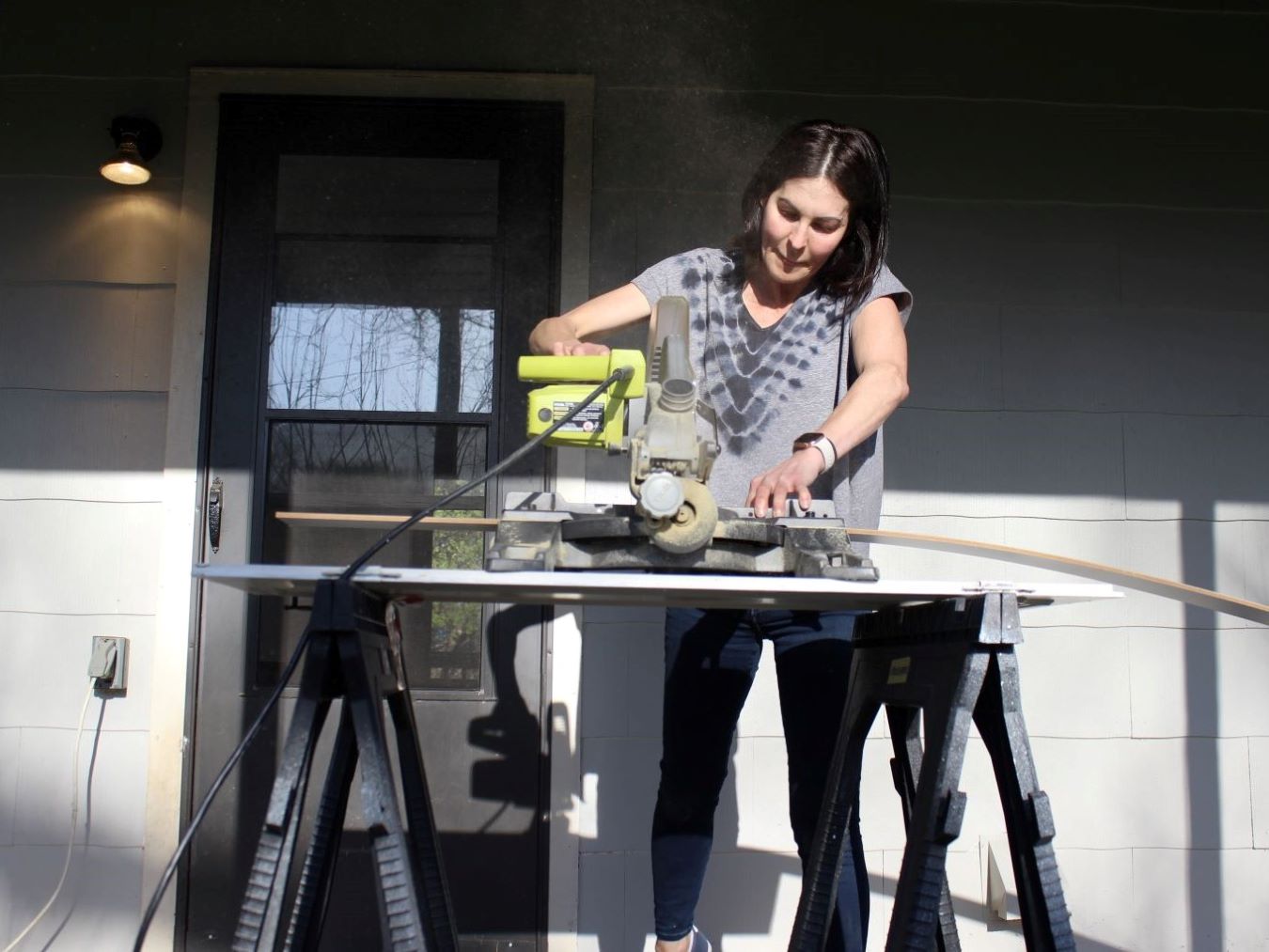Stephanie Reid measured the space beneath a set of kitchen cabinets to make sure she cut a piece of floorboard trim the correct length before drilling it into place. Then she applied a new coat of white paint to a bathroom shelf. An electrician’s power tools blared from another bedroom as she cataloged the work remaining on the afternoon’s to-do list.
When she isn’t showing homes or closing sales as a realtor in the hyper-paced Springfield housing market, she is often renovating houses like this one near Bass Pro Shops, which she purchased to convert to an Airbnb.
Last year at this time, she was counting the days until her career as a full-time teacher ended.
While buying, remodeling and renting out houses presents its own challenges, Reid described them as invigorating ones. In contrast, the challenges of teaching were draining, she said, and that is part of what pushed her to leave a career she felt was her calling.
“I am not exaggerating when I say that there was not a week that I put in any less than 60 hours a week to teaching,” she said. “But, I didn't mind it. I knew what I was getting into. And the only way I knew how to do anything was to feel like I was doing it well, otherwise I wouldn't have enjoyed doing it. I'm too much of a perfectionist like that.”
Reid said she loved her students and loved developing exercises her classes had so much fun doing that they may not have realized they were learning in the process. When some of her students found out she was leaving, Reid said they asked if she would tutor them, which she still does.
Second in a series
Hauxeda Reporter Cory Matteson reports on a growing number of Springfield Public School teachers who are making the decision to leave the profession. The problem is not limited to Springfield. The state of Missouri has averaged 11 percent attrition over the past six years — three percentage points above the national average — according to the Missouri Department of Elementary and Secondary Education.
Reid’s story will seem familiar to many of her former colleagues in the Springfield Public Schools. As detailed in an April 20 story in the Hauxeda story, in just the past three years, more than 300 teachers filed for retirement or resignation in time to receive an early incentive — and that doesn’t include many others who chose to leave without the benefit of an incentive payment.
Already this year, more than 130 teachers — roughly 9 percent of the total number of teachers in the district — have given early notice.
RELATED STORY
Springfield schools facing exodus of teachers
Susie Compton loved her third-grade students at Truman Elementary School so much, she stuck it out another year, rather than retire mid-pandemic. After being able to teach her students face-to-face again this year, she was ready to focus on her family and make the decision to leave the profession after three decades in it. This…
Reid gave her notice in early 2021, sending her resignation letter on the first day a $1,000 bonus was available.
The former Wilson’s Creek Intermediate School sixth-grade teacher said she was fortunate to have the privilege to make the decision to leave. She received some inheritance from her grandparents, which allowed her to build a woodworking hobby into an eventual second career as home restorer and property manager.
“It's a gift from the heavens, and I am living my best life now,” Reid said. “I got my real estate license and I have eight properties. Most of them are rentals. One of them, I've just gone through the process with the city to get it ready for an Airbnb, and another one is in the middle of the process. And I love it, and I am working my butt off. But I love it and I am so thankful every single day that I am not a teacher, and it's really sad to say that.”

‘I can't do this any more'
Reid said that, when she made the decision to resign in January 2021, she first told her teaching partner at Wilson’s Creek, “and we cried it out.” Then she went to her principal’s office.
“She was supportive and nice, and she wasn't surprised,” Reid said. “I said: ‘I can't do this any more, Karyn. You know, I just can't. You've seen me this year. I've completely lost myself.'”
Citing district policy, Wilson’s Creek Principal Karyn Christy said she could not comment on issues specific to Reid, while adding that her award-winning school has not lost a large number of teachers in recent years. Of the 308 Springfield Public Schools teachers who filed for retirement or resignation in time to receive an early incentive over the past three school years, five, including Reid, worked at Wilson’s Creek.
Christy said that, at a time when employees across all occupations are taking on extra tasks, she has looked for opportunities to encourage her staff to have a healthy work-life balance.
“I am trying more and more to let teachers know that if they need to take their lunch hour and clock out and go home and let their dogs out, they can certainly do that,” she said. “Teachers need to know that they have a life, too, that I care about their personal life and I care about them as people and as family members, because if we stop doing that, we are going to lose teachers. But I will tell you, I haven't lost a lot of teachers. I'm very blessed here. We have a great school.”
After Reid joined the staff as a sixth-grade English and social studies teacher, she regularly posted videos and photos on social media of her students at their best — smacking game show-style buzzers to answer questions about Greek agrarian practices or going to a pizza place to celebrate the end of a quarter.
“I always loved kids of all ages, and their energy,” she said. “And once I got into the instructional part of it, I loved trying to find creative ways to make them feel like they're playing or having a really good time and not really even realizing they're learning things.”
The frequency of social media posts decreased soon after the pandemic began.
Drawn to helping underdogs
A Springfield native who attended the University of Kansas, Reid, 48, said she tried five or six different majors before settling on education. As a kid, she often pretended to be her cousins’ teacher at family gatherings. In college, she felt pressure to become a doctor or lawyer and initially — ironically, she says now — had an uninformed opinion of teaching as an easy profession. When she switched majors and started to learn about curriculum and gain experience in classroom settings, she found it was not easy at all, and that she loved it.
She began her teaching career in Grenada, Mississippi, at a rural middle school she said was populated with underprivileged students. Her first year was a shock to the system, an experience she did not feel like college classes in any way prepared her for. She taught third grade that first year. Five of her students, she said, were 12 years old.
“I cried a lot my first year because I couldn’t handle the class,” she said. But she kept trying to navigate it, and worked to build connections with the students in her class, including the ones who had been held back multiple times. She considers one of those students to be her greatest success story, and also considers it a travesty that he had been held back in the first place.
“I remember him coming to school with a burn on his hand one day and I asked him about it, and he had gotten up to iron his clothes that morning,” she said. “I just was so blown away that he had the self-respect to want to look nice coming to school. That kid ended up being my right hand man.”
Reid said she was drawn to helping underdogs, and taught in Mississippi for five years before moving to Springfield with her then-husband, who got a job at a law firm in her hometown. She wanted to work in a school with underprivileged students and started at Study Middle School in northwest Springfield. (It’s now Study Alternative High School.)
In the spring of her first year of teaching, she went into premature labor. With care, her second child was born about six weeks early, and Reid stayed home to care for him until he reached kindergarten. Financially, she was capable of remaining a stay-at-home mom, but the teaching profession continued to call to her. She taught part-time for five years in her church preschool, and when her old Study principal reached out with a full-time opportunity, at the Greenwood Laboratory School on Missouri State University’s campus, she jumped at it. She taught algebra there for a year before returning to the northwest side of town, this time at Bowerman Elementary School. The school is home to the highest population of free and reduced lunch applicants in the entire district, a campus of underdogs.
“I fell in love with these kids and just wanted to take care of them, but at the same time I eventually left Bowerman because it was so emotionally draining,” she said.
The constant up-close experiences with poverty, coupled with a change in administration at Bowerman, led Reid to want to leave the school, but not the profession.
Difficult parents were the breaking point
Reid’s breaking point came less than a year into the pandemic, when she said a student’s parent complained repeatedly about his son’s English grade in the fall of 2020. The student had received a B, she said.
Reid said she has had wonderful experiences with parents, and annoying, but navigable, experiences with some during the course of her career in education. This was different.
“I've had difficult parents to deal with, and just kind of pain-in-the-butt parents and exhausting parents, but I've never had a parent get confrontational or personally attacking me,” Reid said.
Christy, the Wilson’s Creek principal, said generally it is not unusual to get calls from parents questioning grades, and she is sometimes brought into those discussions. When she is, she said, she tries to view situations from all perspectives involved — the educator’s, the parent’s, the student’s.
“I would say that a person's perspective is their perspective, and they believe it and it's their truth,” Christy said. “And so, I have to sift through all that, and then we have to come to balanced decisions.”
Reid’s truth, in part, is this. She said the incident with the parent was the last straw, but not the first.
“Teachers feel attacked, and we've been attacked,” Reid said. “We have been being attacked for years, and it's so much worse since COVID. The whole world is so divided, and people are so quick to just be mean and hateful and lash out, and it's just insane.”
By the time that she signed her paperwork to resign, she left SPS feeling like both district-level administrative and parental support was lacking. She said she and other teachers were overburdened by a paperwork-heavy discipline policy and school work students were allowed to turn in on the last day of every quarter, which she said many of her students did.
She said the SPS system for disciplining students, which was overhauled in 2019, placed an unrealistic burden on teachers to document numerous incidents. She recalled once talking with her principal about a student who was testing her, and her principal asking if she’d documented the incidents. She answered honestly: no.
“I said if I documented all this stuff, I wouldn't get any teaching done,” Reid said.
She said those issues predated the pandemic, and then, after schools reopened, the pandemic intensified them, while also adding on the stress of the pandemic.
When some students skirted the once-mandatory mask policy, it was particularly frustrating to Reid for several reasons. Reid has lupus and asthma, and was immunocompromised. And four days before her final school year began, she learned her estranged father had contracted the coronavirus and died. But she kept that all from her class, she said, until a student argued about wearing a mask.
By the time the parent complained about the grade, she said she was ready to go. After that, she said, she went into survival mode for the rest of the school year.

District recognizes teacher stress levels
In an interview with the Daily Citizen, John Mulford, SPS deputy superintendent, said there were two key areas of support teachers need to know they have as they make decisions about their careers. One, he said, is administrative support, and the other is parental support, and the district only has control over how one of those is provided to educators.
He said administrative support is a top priority of Superintendent Grenita Lathan, who is completing her first school year. Lathan made it a mission to visit every school in the state’s biggest district during her first months in Springfield, and she continues to make classroom visits, sometimes by surprise, to show her support for teachers across the district. She has also held group conversations with educators and other staff across the district. Those Gather with Grenita sessions are meant to be a place where staff can candidly share their thoughts in an effort to address their issues, Mulford said.
At an April 12 school board study session, encouraging candor was a topic of discussion that several board members weighed in on in regards to educators who are leaving the district. Mulford said the district was considering offering group sessions in an effort to encourage departing teachers to be forthright, because so few in the district, and across the public education system, take the opportunity to schedule a one-on-one exit interview on their way out the door.
At that meeting, Mulford grew emotional as he talked about the added workload teachers have taken on during the pandemic, and called for more community support. He also was featured in an interview on KY3 about proposed financial penalties for teachers and other staff who break their contracts, and held back tears as he talked about how much teachers care about the success of their kids, how they take it personally when their students struggle and how there has been an attack on public education in recent years.
Reid, who left SPS before Lathan became its superintendent, watched that interview.
“It seemed very heartfelt,” she said. Then, she took a piece of paneling out to the back yard, where the miter saw at her rental property was set up.


